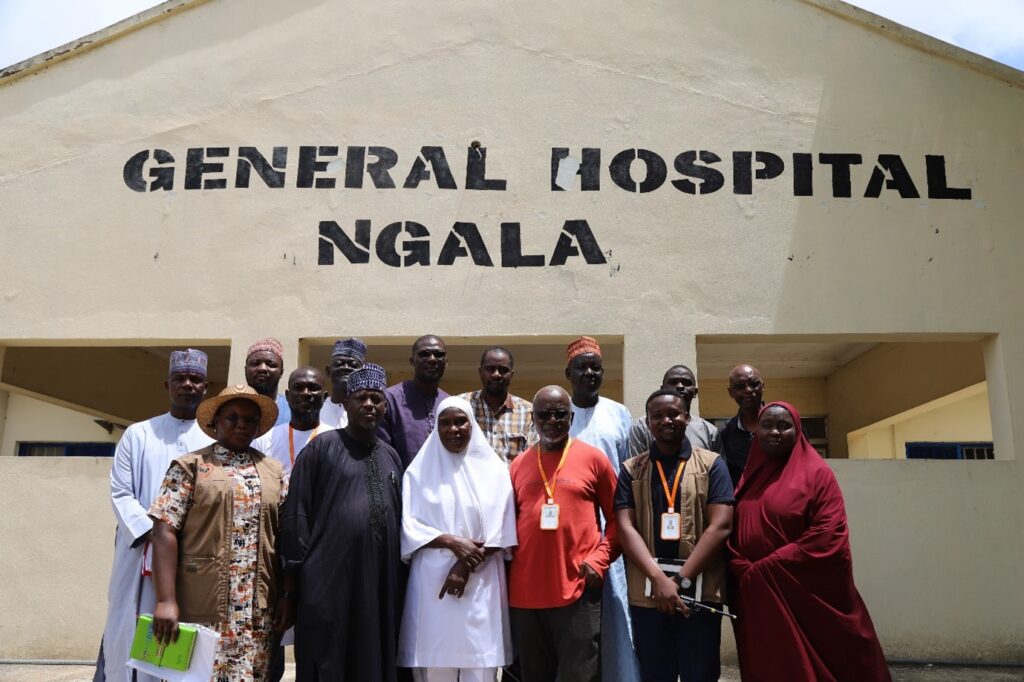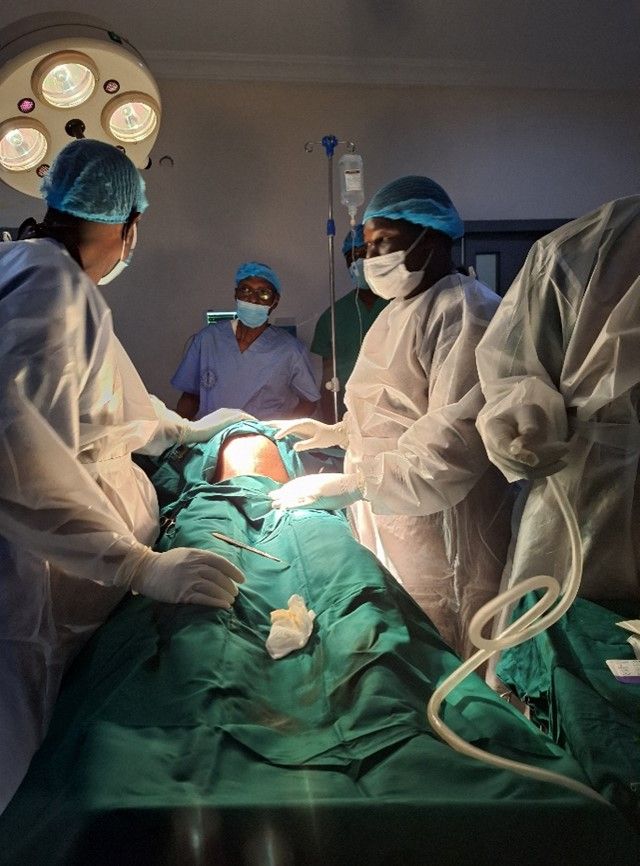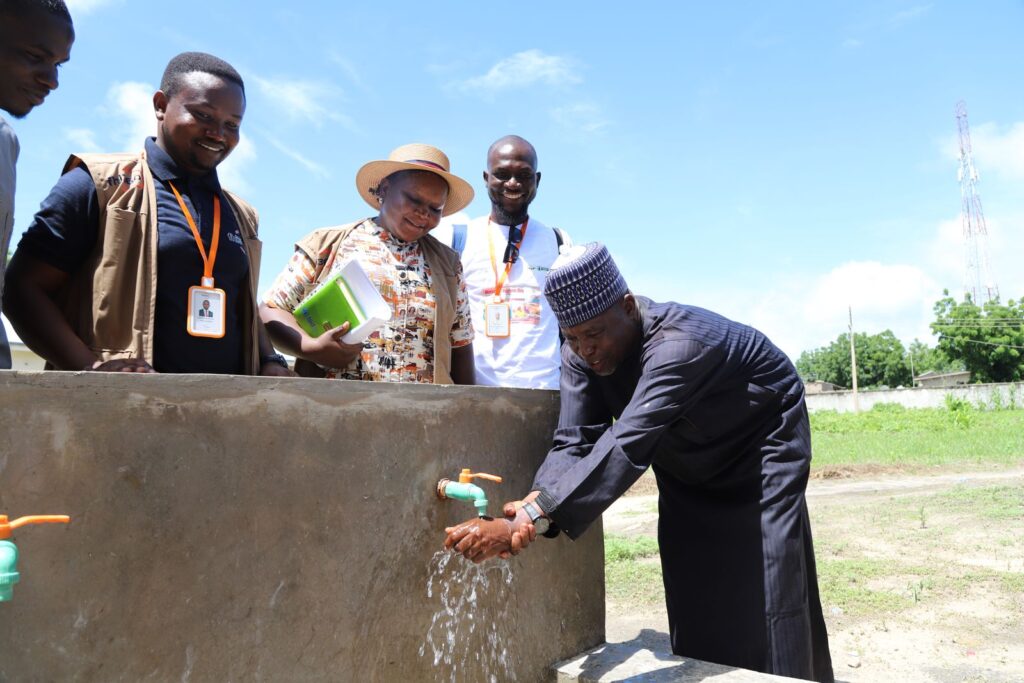FHI 360 Collaboration with Borno State Ministry of Health
Introduction of Comprehensive Emergency Obstetric and Newborn Care (CEmONC), at General Hospital Ngala, Borno State.

Since 2017, with support from USAID’s Bureau for Humanitarian Assistance (BHA), FHI 360 has been delivering integrated lifesaving services, including Health, Nutrition, Protection, and Water, Sanitation, and Hygiene (WASH) to conflict-affected populations in Borno State.
The Ngala local government area in Borno State is one of the worst-hit locations affected by the armed conflict in northeast Nigeria. Located near the Cameroon border, Ngala was once a thriving commercial city. However, the onset of the armed conflict has resulted in mass displacement of its residents, leaving them with minimal means of survival.
The health sector in Ngala is one of the hardest hits, with many healthcare centers now destroyed and in a state of disrepair. At the same time, those that are still operational face significant challenges, including a lack of adequately trained healthcare staff and medical supplies due to inaccessibility and ongoing insecurity. In Ngala, FHI 360’s health sector intervention includes outpatient consultations, a cholera response service center, laboratory services, sexual and reproductive health, immunization, health education, and pharmaceuticals. By 2021, FHI 360 expanded its support to include life-saving higher-level care, such as blood transfusion services, and inpatient care, further strengthening Ngala’s Primary Health Care (PHC) services.
Over the years of implementation, FHI 360 has delivered healthcare services to over 100,000 people annually, including refugees from neighboring Cameroon. Despite this achievement, the absence of secondary healthcare services, particularly Comprehensive Emergency Obstetric and Newborn Care (CEmONC), remained a significant challenge. For complicated maternal cases in Ngala, the only viable solution was referring patients to Maiduguri, over 190 km away. This referral process faced numerous challenges, including unplanned overnight stays along the route. Cross-border referrals to Fotokol, Cameroon, were even more difficult, as support from the Nigerian side was not feasible. These issues led to increased maternal and newborn complications and mortality.
Collaboration with Borno State Government
At the onset of the USAID-funded NE-CORE Consortium Project led by FHI 360, a primary focus was advocating for the Borno State Government to allocate funds for upgrading Ngala General Hospital. After several meetings with the Borno State Ministry of Health, a budget was finalized to support the upgrade of the hospital and enhance its capacity to provide healthcare services. The government-planned upgrades also complement several rehabilitation projects that FHI 360 had planned for the hospital. These include upgrading the borehole system to supply water throughout the entire facility, rehabilitating the stabilization center, and enhancing the hospital’s solar power system. As part of this collaboration, FHI 360 is providing 10kWh of solar power, while the Borno State Government is contributing an additional 40kWh.
Borno State also renovated several rooms within the hospital and converted them into a surgical theater equipped with basic tools to enhance secondary health care services and commence Comprehensive Emergency Obstetric and Newborn Care (CEmONC). Additionally, the medical laboratory was rehabilitated, expanding the blood bank and transfusion services. The pharmacy store was also upgraded to meet standards, ensuring the maintenance of the cold chain to preserve drug potency. These improvements significantly bolstered the hospital’s capacity to deliver critical healthcare services and are crucial steps toward sustaining long-term healthcare support in the region.
During a recent visit to the General Hospital, Prof. Abubakar Kullima, Chief Medical Director, Borno State Hospital Management Board commended FHI 360 for the efforts: “It is on record that since the establishment of General Hospital Ngala, this is the first-time cesarean section is taking place in the hospital. This is the kind of intervention and partnership we are looking forward to. Imagine without the intervention of FHI 360, imagine the untold hardship the people of Ngala would have suffered. Not only this, but they are also supporting the stabilization center. This period is the lean season where we have a lot of patients coming in. But with the smiles from the mothers who are about to be discharged, you will know that these are wonderful interventions.” He further added.
Nutrition Intervention
To address the high rate of malnutrition, FHI 360 upgraded the stabilization center at General Hospital Ngala to a 20-bed capacity and provided a well-furnished kitchen and milk preparation room for caregivers. This intervention is particularly timely, as recent nutrition sector assessments show that Ngala is among the top five LGAs in Borno State with the highest admission rates of children diagnosed with severe acute malnutrition (SAM), often complicated by acute watery diarrhea, acute respiratory infection, and suspected measles.
Water, Sanitation and Hygiene (WASH) Intervention
FHI 360 enhanced healthcare services at General Hospital Ngala by upgrading the hospital’s water infrastructure. This included improving the borehole system and reticulating water to the theatre, significantly boosting sanitation practices. Key upgrades included the installation of a Grundfos SQ Flex 2.5-2Hp solar submersible pump, a 20,000-liter storage tank, and solar panels for uninterrupted water supply. Additionally, a backup generator and security measures, such as a perimeter fence and solar streetlight, were added. These improvements ensure reliable water access, contributing to better sanitation and overall healthcare quality.
Progress so far

Currently, secondary healthcare services, including surgical interventions have commenced at the General Hospital, with the first cesarean section carried out on August 1, 2024, successfully saving life of an eclamptic mother, Falmata, and her baby in active convulsion.
Falmata’s mother expressed her deep gratitude saying: “My daughter’s life would have been with God by now if not for the surgery she had yesterday. She was lying half dead when we came to the hospital, thank you FHI 360 and the Borno State Government for saving my daughter God Bless you all” says Falmata’s Mother.
Bintu is another mother who underwent the cesarean section said “I remember the previous CS I had, I was transported to Mhada a town in Cameroun about 4 hours journey from Ngala, I was unconscious, and I suffered, now I had the CS right in Ngala General Hospital myself and my baby are fine now, thank you FHI 360 and Borno state government for the support”.
Falmata and Bintu’s stories reflect the experience of many women in crisis who struggle to access healthcare due to the impact of conflict.
“The lack of CEmONC services in Ngala is quite challenging to the BEmONC services we are providing, I could remember there was a month we recorded about 15 cases of life-threatening labor complications from eclampsia, Abruption, Placenta previa, etc. in Ngala requiring emergency higher level care. But no availability of care and roads are not accessible. I am so happy that this has become a reality in Ngala, and I believe more lives will be saved through this intervention”, highlights Maravi Dauda, technical officer, Health and Nutrition Ngala, FHI 360.
Since the introduction of enhanced healthcare services in Ngala, four successful cesarean sections have been performed, marking a significant improvement in maternal care for women in the region. Additionally, three adult males have successfully undergone surgeries for inguinal hernias and appendicitis. These operations highlight the broader impact of the improved healthcare infrastructure, addressing not only maternal health but also other critical medical needs in the community.
Opportunities for Improvement
FHI 360 is collaborating with Borno State to prioritize the deployment of permanent medical personnel to local hospitals. Currently, the state relies on a locum system, deploying 4-5 medical teams each month from Maiduguri University Hospital. This approach is a stopgap measure, necessitated by the challenges of finding medical staff willing to commit to long-term positions in these areas, compounded by the difficulties of funding their incentives and the lack of adequate accommodation.
To address these issues, Borno State has committed to including staff housing funds in its FY 25/26 budget. However, relying on a locum system in a humanitarian context is not sustainable. FHI 360 will continue to advocate for proper budgeting by Borno State, emphasizing the critical need for investment in human resources, equipment, and pharmaceuticals, as collaborative efforts continue to support the state’s 25-year strategic plan.
Health Intervention







